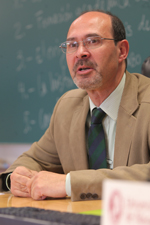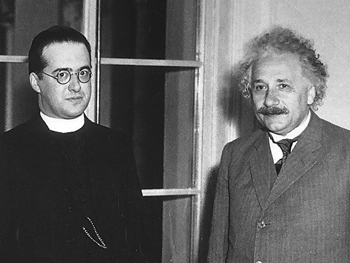“El relativismo es el cáncer de la ciencia: si no se tiene fe en lo que se busca, difícilmente se puede acceder a ello”
"Relativism is the cancer of science: if you don't have faith in what you are looking for, you can hardly access it."
Eduardo Riaza, member of the Spanish Royal Society of Physics, gave a seminar on the father of the Big Bang Theory, organized by the group of research "Science, Reason and Faith" of the University of Navarra.

Eduardo Riaza Molina, member of the Spanish Royal Society of Physics and professor of Physics and Chemistry at high school Retamar in Madrid, gave a seminar of group of research "Science, Reason and Faith" of the University of Navarra.
In the session on"The Universe of George Lemaître", he reviewed the profile and contributions of this astrophysicist and Catholic priest, father of the Big Bang Theory. Eduardo Riaza has recently published the first biography of this scientist in Spanish under the title degree scroll The story of the beginning.
Eduardo Riaza's blog about Georges Lemaître
-Great researchers like Lemaître were strongly influenced by the Philosophy. Do you also perceive this trend in today's scientists or is there a deficiency in their training and perspective in this regard?
The field is very wide. Some scientists ignore the Philosophy and others take it into account, but perhaps their training in this field is far from the realist Philosophy of Thomas Aquinas that Lemaître had in mind. This allowed him to arrive at a good fit between the theoretical hypotheses proposed by Einstein and astronomical observations. The relativism that one sometimes sees in science or in scientists is the cancer of science: if one does not have faith in what one is looking for, one can hardly have access to it.
The Big Bang Theory was proposal by Lemaître, a Catholic priest. However, some people now think that it is contrary to the existence of God. How did this paradox come about?
Georges Lemaître is very little known; in fact, there are practically no references to him in Spanish libraries, as I found when I wrote his biography. Those who have worked in the same field as him avoid naming him. This may be due to a religious prejudice, especially against Catholicism. However, it is also inappropriate to make him a standard-bearer of apologetics, as he rejected. This is shown by the fact that he wrote to the collaborators of Pope Pius XII after a speech of the latter in which he implied that Lemaître's theory supported the idea of Creation. He did not want to mix the two aspects.
 |
| George Lemaître and Albert Einstein. |
| Photo: Courtesy |
- Lemaître was an example of early scientific vocation. What is the formula to awaken it among young people? Is it possible to do it only from the most technical aspects?
Today there is a great lack of scientific vocations and many resources are being used to solve it. The problem is that, in the face of this difficulty, the wrong answer is given: easy science, accessible to everyone. It is necessary to disseminate, but not by lowering the level or losing rigor. In fact, the programs of study should be raised. The tendency of the laws of Education is to equalize from below. Thus, attention to diversity tends to focus on those who do poorly, neglecting those who stand out. On the other hand, I think that there should not be a division between science and literature: from an early age, reading, the contemplation of nature, or the enjoyment of theater should be promoted. If we allude to the lives of scientists like Einstein or Lemaître, among others, we see that in addition to this facet they had another humanistic one; they played a musical instrument, they were artists...
-Lemaître shows that scientific excellence and faith are compatible. What can his figure teach today's scientists?
Although his personality was very rich, I would highlight his sense of humor and, especially, his love of truth. Moreover, he was never prejudiced: he proposed an infinite model in time that was, supposedly for some, incompatible with revelation. But since philosophically he saw no drawbacks, he had no problem in admitting it. This freedom of thought can be a great example for others.
-What role should Catholic scientists have in society?
First of all, they have to be very good scientists. Then it is vital that they get involved in knowledge dissemination. This does not give as much prestige as publication in specialized journals, but it has a great impact on society. The concept that the average citizen may have of what science is is far from what it really is. Moreover, their beliefs are tinged with New Age fashion and superstitions or para-scientific aspects that have no entity. For example, there is a stronger belief in things like 'positive energy' than in empirical science or God.
How would you rate the current scientific knowledge dissemination ?
On the one hand, on many occasions it is used to attack the Church from some aspects or, at least, it seeks confrontation. For example, cases like Galileo's are brought up, seen from a biased perspective. Without making a crusade, it is necessary to expose things so that history is written objectively. We must not generate controversy or vindication, but be fair to the protagonists, avoiding prejudice.
